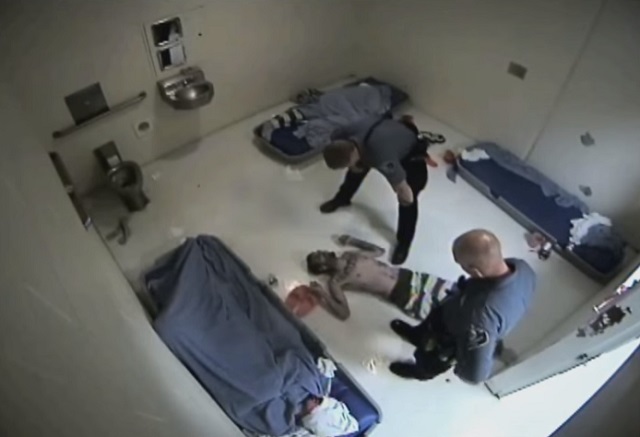PORTLAND, Ore. (KOIN) — Oregon State Police recently reported the death of a woman in Curry County Jail. Officials said Cassadi Bond was detoxing from heroin use when she died — the case is now under investigation.
Her case is just the latest in a string of heroin-related deaths behind bars that’s raising alarm with advocates. They’re worried it’ll happen more with the nation’s growing heroin crisis.
Read Corizon Health’s full letter below
The problem has also led to several lawsuits — one of them was filed in Portland by a family who believes they never should have lost their daughter.
In April 2014, 26-year-old Madaline Pitkin approached jail staff for help while suffering from heroin detoxification.
“I just can’t imagine not helping someone when they’re pleading for help,” Mary Pitkin, Madaline’s mother, said.
Seven days after being admitted to the Washington County Jail, she was found dead inside her cell.
Madaline’s father — Russell Pitkin — received an unexpected visit from a Washington County Sheriff’s deputy shortly after.

“He basically addressed me right away and said that my daughter had collapsed and died and they weren’t able to revive her,” Russell said.
Tim Jones, the Pitkin family attorney, said Madaline died needlessly on a jail cell floor.
“The unfortunate thing here is all it would have taken is a bag of saline solution and IV, and that would have saved her life,” Jones said.
Another heroin-related death happened 2 years ago in Colorado. Tyler Tabor was also fighting addiction when he died behind bars.
The Tabor family attorney David Lane said, “To die like a dog in a jail cell when you have family that loves you, when you are so easily treated is simply an outrage.”
According to Jones, one of the side effects of detoxification from opioids — particularly heroin — is dehydration, so if it’s not managed properly, it can result in death.
The Pitkin lawsuit lists Washington County and Tennessee-based Corizon Health — the county’s contracted jail care provider at the time of Madaline’s death — among the defendants.

According to the lawsuit, Madaline made 4 written requests for help because symptoms she was experiencing from heroin withdrawal — like vomiting and diarrhea — were severely dehydrating her.
In one of her requests, Madaline wrote “I haven’t been able to keep foods, liquids or meds down in days, I feel like I’m very close to death. I can’t hear. I can’t see. I’m hearing voices, please help me.”
Mary said, “I just can’t imagine people that are so heartless. They maybe don’t view prisoners as people, I don’t know.”
Jones said the best way to deal with dehydration under circumstances like Madaline’s “would have been an IV and it wasn’t given.”
“I’ve had case after case where private medical care providers — in an effort to save $20 — don’t give somebody prescription medicine and they die,” Lane said.
Both the Pitkin and Tabor lawsuits allege that Corizon failed to provide timely and complete medical care. Attorneys for both families told KOIN 6 the cases are expected to go to trial sometime next year, though Tabor’s attorney said they may reach a settlement before then.
“We’re working hard to settle it, we think we can get that done, but if not we’re off to the races at trial,” Lane said.
Video shows Tyler struggling on his knees, ringing a button for help, after asking for an IV earlier. According to court documents, he died only a few hours after that and his death could have been easily and completely prevented by the health care providers.

“Their attitude is these guys are prisoners, who really cares,” Lane said.
Madaline’s family was never able to make contact with her inside the jail. A letter they wrote was sent back because it lacked a complete return address.
“We loved her very much,” Mary said.
The Pitkins are now left with only memories and pain and hope legal action will help stop needless deaths by detoxification.
“The hope is that there’ll be changes in counties like Washington County and changes with companies like Corizon that will prevent other families from enduring a loss like what the Pitkin family has,” Jones said.
After KOIN 6 News reached out to Corizon Health for comment, Director of External Affairs Martha Harbin said in an email,
These two tragedies are currently involved in litigation, which – along with HIPAA privacy protections – restricts our ability to share details of these cases. We can tell you that each involves a different set of facts that are unique to each case and that have not been publicly shared. The allegations being made about Corizon Health policies regarding care simply are not true. We have successfully treated thousands of patients detoxing from all manner of addictive substances following standard clinical protocols. It defies logic that we would risk multi-million dollar judgements or settlements, or even the costs involved in defending our care in cases that are dismissed or judged in our favor, not to mention the damage to our corporate reputation, over relatively inexpensive clinical treatments or hospitalizations. And none of our clinicians are compensated based on the company’s financial performance.Our country needs a better solution to the opiate crisis than locking up those with substance abuse disorders. We support drug treatment courts, increasing access to community-based programs and medicine-assisted treatment. But as long as these individuals are being sent to jail, we will remain committed to providing care that meets or exceeds community standards.”